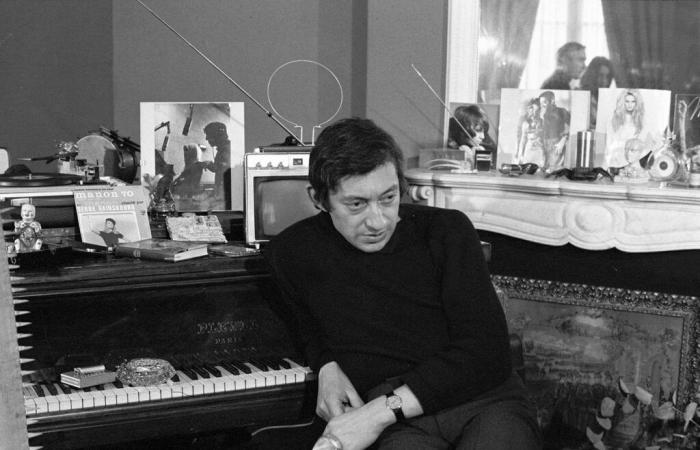In Serge Gainsbourg’s nightclub / Stéphane Girel and Christophe Geudin / Seghers, 192 pages, 25 euros.
With the opening of the Gainsbourg Museum in Paris, fans of the musician have the opportunity to enter into his intimacy, to fill their heads with numerous anecdotes, so many little stories that we like to associate with his thunderous personality. However, the rediscovery of Serge Gainsbourg around several projects, the museum therefore, but also the Gainsbooka reference work published in 2019, allows you to exceed this image of Epinal to become interested in the work of the musician, in his way of composing and experiencing music.
In Gainsbourg’s house, rue de Verneuil, we see piles of books, we hear people talk about films watched with family, we discover the music played thanks to the numerous stacked discs by the musician throughout his career. An artistic, intellectual environment, which has continued to inspire Gainsbourg and inform his relationship with the world.
New contribution to this reflection, In Serge Gainsbourg’s nightclub is a detailed exploration records, cassettes and compact discs that Gainsbourg liked to accumulate. Richly illustrated in a careful edition, the book is based on a meticulous investigation combining study of the inventory of records listed at his home, observation of photographs on which vinyl or CDs appear in the background and detailed analysis of the numerous interviews in which Gainsbourg spoke about his favorite musicians and his multiple influences.
Large spectre
The result is a discotheque which dialogues with a very broad spectrum of musical genres that the authors, Stéphane Girel and Christophe Geudin, present in chronological order. From the period 1928-1959, Gainsbourg retained Billie Holiday, whom he praised for her talent in giving particular inflection to the words that he thinks he can reproduce in his games with the French language, Miles Davis, with whom he will share a pianist, René Urtreger, and Alfred Cortot, the greatest decipherer according to him of Chopin’s work.
With the following period, we are interested in Gainsbourg’s relationships with Cuban music, Celia Cruz, and American blues, Screamin’Jay Hawkins. Then came rock, the Beatles, the Rolling Stones, Lou Reed, David Bowie, Jimi Hendrix, commercial groups, Ohio Express, figures of the soul and funk, James Brown, Prince or Sade, and reggae, Bob Marley and the Wailers.
The book can also be taken as a fascinating document on the appropriation of English-speaking music in Paris.
A true mental map of Gainsbourg’s influences and the way in which they concretely manifested themselves in his career, the book evokes a series of literal borrowings – Miriam Makeba and her title “Umqokozo” for “Over there it’s natural » and “Poor Lola”; the album Drums of Passion by the Nigerian Babatunde Olatunji plundered with “New York-USA”, the “Hungarian Dance No. 4 in F minor” by Johannes Brahms which can be found in “Things Things”, as well as references plus diffuseslike the early one to George Gershwin that little Gainsbourg studied on the piano from the age of 6.
Jazz punch
Throughout the text, Gainsbourg turn your back to French music – with a few exceptions, including a beautiful passage on Boris Vian – to turn his gaze towards America, England and the Caribbean, where he will seek references and collaborators. As such, the book can also be taken as a fascinating document on the appropriation of English-speaking music in Paris. In the tradition of hard bop, for example, Gainsbourg places little emphasis on John Coltrane or Sonny Rollins but is enthusiastic about Jackie McLean.
Now this, beyond his personal tastes, can be explained by the fact that he discovered the music of this saxophonist at the Théâtre de Lutèce in 1962 during the performance of Jack Gelber’s play, The Connection. Gainsbourg is struck by the strength of the staging and the modernity of the music. Coincidence of his exposure to jazz, but also testimony of the craze of Parisian intellectuals for the African-American struggles, McLean will become his favorite, the one who propelled him into a punchy jazz that he will never cease to admire.
Receive Politis at your home every week!






